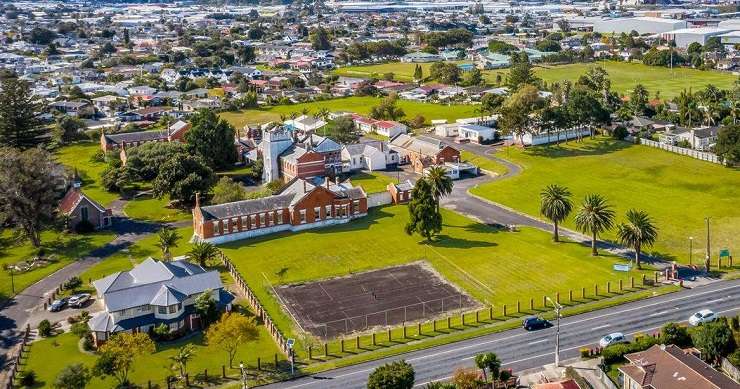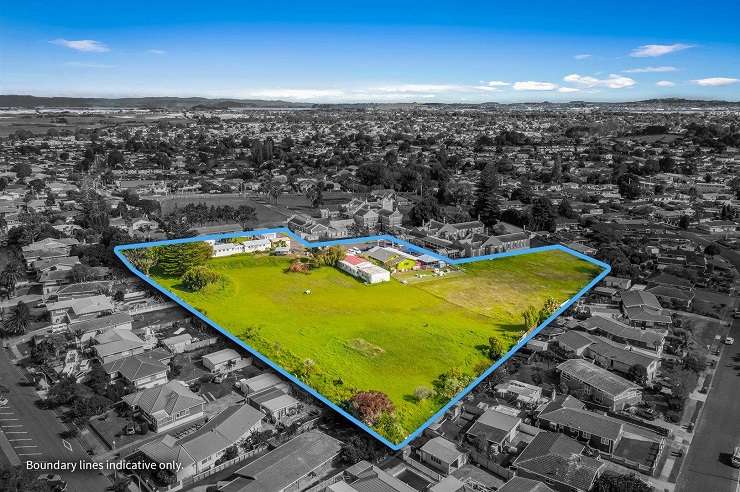A 16,500sqm chunk of land carved off of church-owned grounds in South Auckland has sold for close to $20 million.
The sale of the grounds of the Pacific Islanders Samoan Presbyterian Church, at Wyllie Road in Papatoetoe, was a slow burn as the property was first listed for sale nearly three years ago, in October 2021.
The 16,500sqm site next door to a sprawling brick heritage building – built as an orphanage over 100 years ago and later used by Mangere Hospital in the 1960s to 1990s – was part of an intricate deal that was brokered by Harcourts agents Aman Gulia and David Findlay.
Gulia had earlier told OneRoof the vendors had turned down multiple offers, off-market, of $15m to $20m last year as the church elders searched for an appropriate buyer.
Start your property search
OneRoof records show the property had a 2021 CV of $31.825m. It had been bought by the church in 1993 for $980,000.
Read more:
- Onehunga rich list: Can these flash villas give Ponsonby's $4m homes a run for their money?
- King Charles’ Hobsonville defence land asking over $5.2m
- ‘Cruel reality’: Developers offering huge discounts to bulk buyers as interest rates bite
“The terms [of other offers] didn’t suit the church,” Gulia explained.
“The church wanted to sell to the right person, it wasn’t just about the price,” he said, adding that the buyer was a construction company that planned to build 100 homes.
“Due to the complexity of the site and the deal, it took a long time to find a buyer that was aligned not only to make it work financially, but for a mutually beneficial solution,” he said.
Speaking on behalf of the Manukau PIPC development committee that negotiated the deal for the church, secretary Mary Autagavaia said the church has just 300 parishioners from its 43 Samoan families.
“Our aspiration is to utilise the land to provide much needed housing for the community. We are excited to find a buyer who has similar values as ourselves that is family and community-focused,” Autagavaia said in a written statement to OneRoof.
“On the remaining part of the land we aim to build a church and a community event facility. We are in discussion to provide a childcare facility as well. We also hope to build rental housing as an income for our church.”
She added that the church provided community programmes for youth and families across Manukau, so the new facilities would house these services as well as provide community space for the public to use.
Findlay said he and Gulia were surprised at the number of buyers who were interested in the site.

The church retains the original orphanage, built around 1909, and hopes to restore it for community use. Photo / Supplied

The site, in the heart of Papatoetoe, will have a mix of terrace and standalone homes, aimed at affordable entry-level prices. Photo / Supplied
“[Buyers] having the capital required to complete a project like this. The buy price is substantial, the overall costs including the buy and builds will exceed $50m.
“So to have over 50 enquiries [from] people having the ability to produce that amount of capital was impressive,” he said.
He said the buyers, a medium-sized development company (who want to remain nameless for now), have built residential, commercial and other church projects in the past.
“They were very aligned with the church’s requirements and had joint outcomes,” Findlay said.
The agent said that what helped get the sale across the line was working with Auckland Council to rezone the heritage overlay on the site, pulling it back from the entire 42,000sqm property – even the grass was classified Heritage A, he said – to just the buildings and a small portion of the surrounding grass area.
Gulia said the buyer was very excited to work closely with the church on providing an outcome everyone was proud of.
“No exact plans are currently in place, as there are a lot of consents and earthworks to go through first, however the intention is to provide aid to the housing crisis in the South Auckland area with a mix of terrace and standalone homes of high quality, with a church and community events centre conveniently on site,” he said.
“The current intention is to make homes fit for first-home owners to get into at an affordable level, something both the vendors and purchasers are passionate about.”
Autagavaia said the property was now called Fatugatiti, a Samoan word for the process of rebuilding and gathering resilience.
She said the church hoped to renovate the heritage buildings that date from 1909. The dormitories, kitchen and laundries are run-down since the buildings, which were home to special needs classes after the orphanage closed in the 1960s, were closed in 1990 by the then area health board. The church bought the property in 1993 but several vandalism incidents made the place hard to maintain. Findlay said quotes to remediate the buildings reached as high as $15m.
“The cost to renovate and repurpose these buildings is exorbitantly high. This will include re-strengthening the buildings as they are not fit to inhabit in their current state,” Autagavaia said.
“We have been on a long journey to get to where we are now. We also acknowledge the Wyllie family who first gifted this land to the St John’s Orphanage. We acknowledge the support of the Papatoetoe Historic Society who encouraged us many years ago to develop this land and renovate the heritage buildings.
“Mostly we think of the orphans who once inhabited this land as a home, school and farm.”
- Click here to find more properties for sale in Auckland













































































